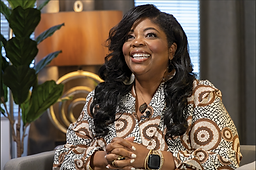Welcome.
Prepare to be Inspired!




About DrT
Dr. Tiffany Manuel (DrT) is a truth-teller, bridge-builder, and lifelong believer in the power of people to create a more just and joyful world.
For more than 30 years, she has walked alongside courageous leaders and good troublemakers—those who dare to reimagine what’s possible for their communities. A social scientist by training and a storyteller at heart, DrT helps changemakers speak the truth of what their communities deserve in ways that bring people closer, rather than push them apart.
As President and CEO of TheCaseMade, DrT works across the country and around the world to help leaders build stronger support for the big ideas that make all our lives better—from affordable housing to health equity to racial justice.
She is the pioneering force behind the science of Strategic CaseMaking™, a methodology rooted in empathy, alignment, and possibility that has helped thousands of everyday leaders mobilize energy, shift narratives, and spark lasting change.
Her work is as personal as it is professional. Raised in Detroit, Michigan, she knows firsthand the power of community—and the cost when it’s denied. That’s why she’s made it her life’s work to translate complex systems into human stories that move people to action. Her books, Fast Track and Case Made!, are guides for the brave souls who choose to lead in times of challenge and change. Her podcast Fierce CaseMaking highlights powerful strategies how we make the case for strong communities.
DrT holds a PhD in Public Policy from the University of Massachusetts Boston and advanced degrees from the University of Chicago and Purdue University. Today, she lives in Orlando, Florida, surrounded by the love of her family, continuing to remind us all that the road to justice begins with the stories we dare to tell—and the hope we choose to hold.




I grew up in Detroit, Michigan—during one of the most turbulent times in the city’s history. The disinvestment. The upheaval. The unfulfilled promises of public systems. I lived it all. But even in the midst of those challenges, I could feel the untapped potential in my community—the brilliance, creativity, and resilience that too often went unseen and unsupported.
That experience is the bedrock of my work today. It’s why I’ve spent more than 25 years fighting to expand opportunity, equity, and inclusion. My work has spanned sectors—private and nonprofit, government and academia—but the mission has always been the same: to transform the policies, programs, and investments that shape our communities so they truly work for all of us.
But let me take you back even further.
When I was little, I wanted to be a computer.
Back then, “computers” weren’t machines—they were people, mostly women, mostly Black women, who did complex calculations by hand. You’ve seen them in Hidden Figures. To me, they were superheroes—using data and math not just to get rockets into space, but to open up new worlds of possibility. They connected people to power. They cracked the code on systems. They proved what was possible.
That dream led me to graduate school, where I pursued the highest degree I could—studying how investments in low-income communities (like the one I grew up in) could deliver extraordinary returns. Not just economic returns, but human returns—improved lives, greater agency, stronger communities. I believed that if I could prove the return on investment (ROI)—and more importantly, the social return on investment (SROI)—that policymakers would finally have to pay attention. That they’d stop underfunding, underestimating, and overlooking people in marginalized communities.
But here’s what happened.
As my skills deepened in data, impact measurement, and policy analysis, the field advanced—but the political will to reinvest in our communities didn’t. The data wasn’t enough. The logic wasn’t enough. Even the moral arguments often fell flat.
That’s when it hit me: we didn’t just need more data—we needed a better way to tell the story.
We needed tools not just to analyze what was happening, but to shift what was possible. We needed stronger skills for building public will—skills rooted in narrative, in strategy, in emotional alignment and cultural resonance. That realization changed everything for me.
As a social scientist, I began diving deeper into the tools that could help explain not just systems, but also hearts and minds—the drivers of decision-making, belief, and action. That journey led me to develop the science of Strategic CaseMaking™—a framework to help everyday heroes and justice-focused movements build the support they need to win bold, systemic change.
My mission now is simple but urgent:
To bring the best of social science, storytelling, and Strategic CaseMaking to the leaders and movements that are working every day to make justice real—in every community, for every person.
Because when we change the energy of the conversations we're having through our CaseMaking, we change what’s possible. And when we fast track that shift, we bring the future we deserve closer to the present we’re building—together.








